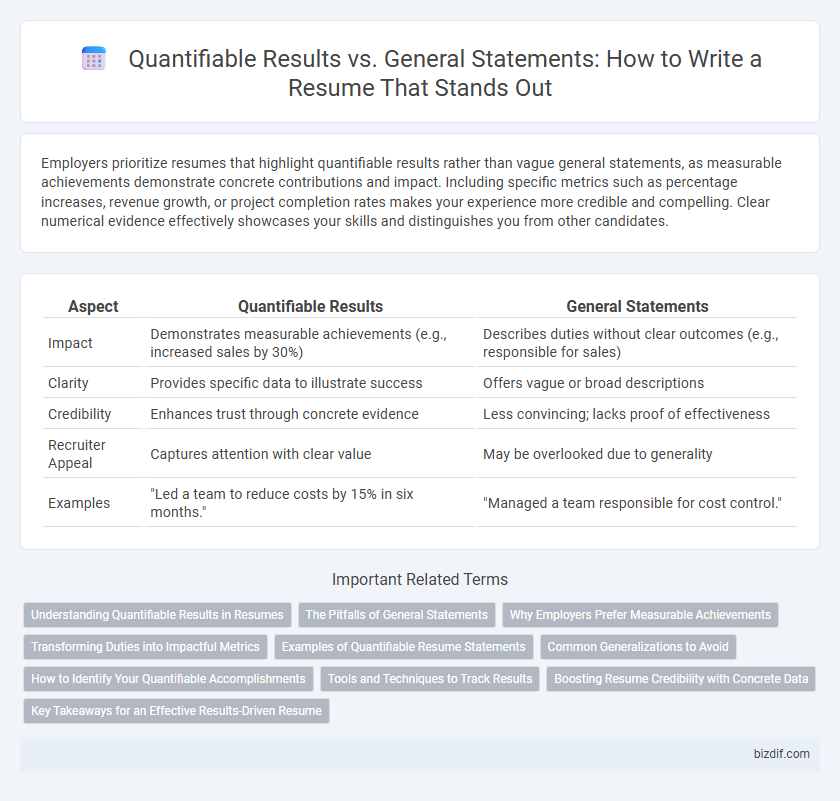Employers prioritize resumes that highlight quantifiable results rather than vague general statements, as measurable achievements demonstrate concrete contributions and impact. Including specific metrics such as percentage increases, revenue growth, or project completion rates makes your experience more credible and compelling. Clear numerical evidence effectively showcases your skills and distinguishes you from other candidates.
Table of Comparison
| Aspect | Quantifiable Results | General Statements |
|---|---|---|
| Impact | Demonstrates measurable achievements (e.g., increased sales by 30%) | Describes duties without clear outcomes (e.g., responsible for sales) |
| Clarity | Provides specific data to illustrate success | Offers vague or broad descriptions |
| Credibility | Enhances trust through concrete evidence | Less convincing; lacks proof of effectiveness |
| Recruiter Appeal | Captures attention with clear value | May be overlooked due to generality |
| Examples | "Led a team to reduce costs by 15% in six months." | "Managed a team responsible for cost control." |
Understanding Quantifiable Results in Resumes
Quantifiable results in resumes showcase measurable achievements like "increased sales by 30%" or "reduced processing time by 15 hours weekly," providing concrete evidence of skills and impact. These specific metrics enhance credibility, catching recruiters' attention more effectively than vague general statements such as "improved sales." Employers prioritize quantifiable accomplishments because they clearly demonstrate a candidate's potential contributions and value to the organization.
The Pitfalls of General Statements
General statements in resumes often lack specificity, making it difficult for employers to gauge actual achievements or skills. Phrases like "responsible for sales" fail to demonstrate impact compared to quantifiable results such as "increased sales by 25% within six months." Emphasizing measurable accomplishments provides clearer evidence of value and effectiveness in previous roles.
Why Employers Prefer Measurable Achievements
Employers favor quantifiable results over general statements because measurable achievements clearly demonstrate an applicant's impact and effectiveness, providing concrete evidence of skills and contributions. Specific metrics such as percentage improvements, revenue growth, or project completions offer tangible proof that can be easily evaluated and compared. This clarity enhances credibility, making it easier for employers to assess potential return on investment in a candidate.
Transforming Duties into Impactful Metrics
Transforming duties into impactful metrics amplifies a resume's effectiveness by showcasing quantifiable results that highlight achievements rather than generic responsibilities. Using specific figures such as percentage increases in sales, project completion times, or cost savings provides concrete evidence of contributions. This focus on measurable outcomes differentiates candidates by clearly demonstrating their value and potential impact to employers.
Examples of Quantifiable Resume Statements
In resume writing, examples of quantifiable results such as "Increased sales revenue by 30% within six months" or "Reduced customer wait time by 15 minutes, improving satisfaction ratings by 20%" demonstrate clear achievements. Employers prefer these statements because they provide measurable evidence of a candidate's impact and effectiveness. Using specific numbers and metrics enhances credibility and distinguishes your resume from general statements like "improved sales" or "enhanced customer service.
Common Generalizations to Avoid
Avoid using vague generalizations like "responsible for tasks" or "involved in projects," as they fail to demonstrate specific achievements. Replace non-descriptive phrases with quantifiable results such as "increased sales by 20%" or "reduced customer complaints by 30%," which highlight measurable impact. Employing clear, data-driven metrics enhances resume effectiveness and improves recruiter engagement.
How to Identify Your Quantifiable Accomplishments
Identify quantifiable accomplishments by reviewing past projects and extracting measurable impacts such as revenue growth, cost savings, or efficiency improvements. Use specific metrics like percentages, dollar amounts, or timeframes to demonstrate effectiveness clearly. Highlight achievements where data-driven results directly contributed to organizational goals or performance enhancements.
Tools and Techniques to Track Results
Using tools like Google Analytics, CRM software, and project management platforms enables precise tracking of quantifiable results in resumes. Techniques such as setting SMART goals and employing KPIs help measure achievements with clarity and accuracy. Incorporating these metrics transforms generic claims into impactful, data-driven statements that highlight real contributions.
Boosting Resume Credibility with Concrete Data
Including quantifiable results in a resume significantly boosts its credibility by providing concrete evidence of achievements, such as increasing sales by 25% or reducing project completion time by 15 days. Specific metrics demonstrate the candidate's impact and make accomplishments more tangible compared to vague, general statements like "improved team performance." Employers prioritize data-driven outcomes that clearly show value, making resumes with quantifiable results stand out in competitive job markets.
Key Takeaways for an Effective Results-Driven Resume
Highlighting quantifiable results in a resume significantly boosts credibility by providing concrete evidence of achievements, such as percentage increases in sales or cost savings. General statements often lack impact and fail to differentiate candidates from others, while metrics-driven accomplishments demonstrate problem-solving abilities and measurable success. Focusing on specific, data-backed outcomes helps recruiters quickly assess a candidate's value and potential contributions to their organization.
Quantifiable Results vs General Statements Infographic

 bizdif.com
bizdif.com